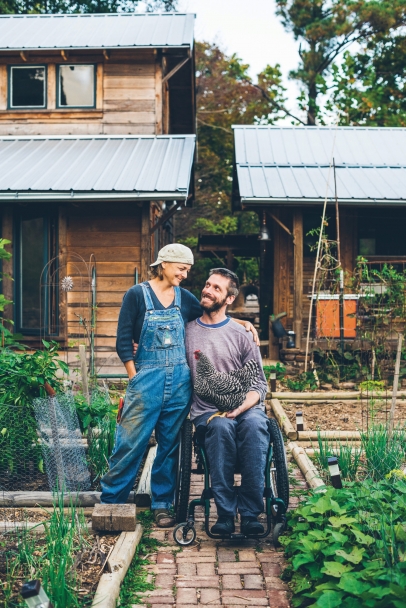Meet Your Farmer: An interview with Laura of Kelly of Windberry Farm
Editor’s note: Laura Kelly and her husband, Dan Dean, live on about 22 acres in Winslow, a half-acre of which is cultivated. Dan said that part of what brought them together as a couple was a mutual desire to live in a house they had built with their own hands. It took them years to save money, find the right place, and build a farm from scratch. While putting a finishing touch on the house, Dan fell from the roof and fractured his spine, resulting in complete paralysis from the waist down. Friends encouraged them to move to town for the amenities city life provides, but the couple have learned to make the farm work for them as a way of self-preservation and means of income. Laura tells us more about their story.
How would you describe your farm? A largely permaculture micro-farm with an emphasis on raspberries, pears, and year-round leafy greens.
How did you get into farming? We’ve always turned any spot with adequate sunshine into food production, but we didn’t have enough acreage to focus on farming until we bought Windberry Farm in October 2009.
What is the most unusual thing that you grow? Most of the crops are quite normal for the South, but I haven’t run into many other farmers marketing Asian pears, raspberries, luffa (loofah) sponges, muscadines, or even scallions in this region.
What farmers markets do you sell at? Winslow Farmers Market, year-round.
Do you direct-source to restaurants? Yes, to Greenhouse Grille, The Farmer’s Table Cafe, Mockingbird Kitchen, and Pesto Cafe.
Do global markets affect your sales? Nope, though of course, I can’t prove that. But I fill such a niche market here in Winslow that has nothing to do with convenience, cost, or volume.
How do you approach insect control and fertilization? We use organic practices, though no certification. Diversity is the biggest strategy. I encourage beneficial insects with wild and perennial flower borders. I’ve seen parasitic wasp eggs on quite a few of my tomato hornworms this year. We enjoy hand-picking the Japanese beetles that so love fruit crops because they are a favored protein source for our chickens. As for fertilization, that is always a concern on our thin, gravelly soil. I import literally tons of organic matter from the sawmill, tree trimmers, horse owners, and such, so as to increase the organic matter and living activity in the soil. Most of the sawdust gets composted here first. When I add lots of this compost to soil before planting, I am sending a big invite to armadillos to dig it all up in search for grubs, so I have to sprinkle cayenne powder generously. I also indulge flats of seedlings with fish emulsion, and enjoy watching the rapid, appreciative response.
Do you farm year-round? The farm is as full of produce in winter as in summer, but because of slower growth, harvests are a lot smaller. We use three hoop houses and a greenhouse (with rocket stove for emergency heating).
Do you raise animals? We keep a small flock of chickens for eggs and insect control. Guy Ames gave me the idea that chickens may be able to control the plum curculio moth larvae if encouraged to forage under peach trees. So, I have planted one of our peach trees in the chicken run, and it should bear its first crop this coming summer. I’ll have to figure out how to encourage the chickens to more intensively forage under the other scattered peach trees, or they will be for pollination purposes only, as the curculio will certainly devastate a stone-fruit crop without intensive intervention.
Do you end up with much excess produce? Not more than Dan and I can eat.
How has the cost of farming changed? What cost-containing measures work for you? We have yet to have a “non-investment” year, so we don’t have an easy way to compare annual routine costs. We take advantage of free organic matter sources in our area and stay small enough to not hire labor.
Where do you see your farm in 10 years? In 50 years? In 10 years, the orchard should be in full production, so perhaps there will be less emphasis on fall vegetables to balance labor requirements. I’d like to set up a more efficient way to create value-added goods, too, like raspberry jam and raspberry chipotle sauce. In 50 years, somebody else will be making the decisions around here, as we will be either dead or pushing 91 and 100 years of age!
What brought you to Arkansas? I grew up in St. Louis, Dan in Little Rock. I moved to Arkansas to check out the affordability of farm land in a region with adequate precipitation and fairly mild winters.
What mindset do you use to approach farming with the tension between nurturing and forced detachment? I don’t resist the pain of watching the plants suffer through drought, or of having to cull a hen. It just makes the joy of rainfall and of young chicks all that more poignant.
Why do you stay in farming when, if the reputation is to be believed, it’s such a hard way of life? I’d be bored with an easy way of life, and Dan, I think, doesn’t want me to be bored.
If you were not a farmer, what would you be? A neurosurgeon. Well, maybe, who knows? I am fascinated by the mysteries of the brain. Dan would probably work in some facet of the music industry.
What is your go-to meal after a long day? Whatever is in the garden, or better yet, left over from market that week. I love it when the sweet peppers are in abundance, as we fry up a huge panful with onions and garlic and call it Pepper Medley. So yummy.
What do you usually eat for lunch? It varies by season, but lately we have lots of pepper and tomato sandwiches on our homemade bread with our homemade mayonnaise – yum. Dan prepares them, and I listen for the “dinner bell” to ring. If we’re lucky, we get a few figs, too.
When do you feel most appreciated? As a farmer, at every market and every restaurant delivery.
From what/where do you draw inspiration? Lately from Lucie and Jason of Locally Laid, as I’ve just read the book of how they created a “plucky, industry-changing egg farm from scratch.” They worked so hard because they believed in the sustainable model.
What’s the best part of being on your farm? Oh, so many best parts. The sunrise over the hills, starting a fire for coffee each morning, the site of a whole row of germinating spinach, eating all the raspberries I want for almost three months of the year, the warmth inside the high tunnels and greenhouse in the winter, the sound of the rocket stove that heats our house, the silly chicken antics, watching the annual cycle of a pear tree’s production – and having to thin the fruit so the branches don’t break – and so much more. I have to leave the farm twice each week – for our town trip, which includes restaurant deliveries, and to sell at market just down the hill here in Winslow. All other times, I just want to be here, on the farm. I love it.
On average, how many hours do you work per week/during each season? Probably 50 hours or so most weeks all year round (though more if you count firewood acquisition). I have a great headlamp and other lamps to help with late winter chores. In any other job, the work week would seem too long, but here, it is just what I love to do. Each day is different. The background projects that ebb and flow over the normal row production schedule are always different. Some of them, like my current job of digging out a 9,000-gallon cistern whose pond liner collapsed, are less than joyful, but all of them provide the satisfaction of creating a better working farm.
Anything else you’d like to mention? The life we have created on Windberry has been a life-long goal for me, and I am always mindful that, without the support of my local community, my work would be meaningless. If I weren’t filling a much-expressed need for good food, well, then I wouldn’t have a mission here. ■





